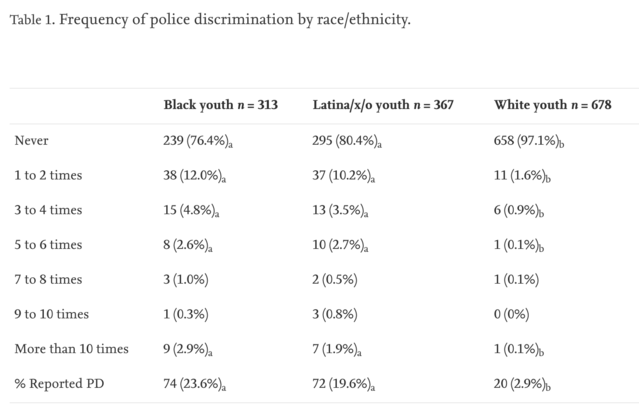Bias
How Many Teens Face Police Discrimination?
Racial discrimination can have repercussions for academic achievement.
Posted June 29, 2021 Reviewed by Abigail Fagan
Key points
- More than 20 percent of Black and Latinx high school students reported that police hassled them in the last year, according to a new study.
- The experience was more unusual for White students, with only 4 percent reporting being hassled by the police.
- Being hassled by the police was associated with lower grades and less academic engagement for all youth.
The murders of George Floyd, Breonna Taylor, Ahmaud Arbery and others have both broadened and sharpened awareness of police discrimination faced by people of color in the United States.
A recent paper published in the Journal of Adolescence highlights how prevalent the experience of discrimination is among Black and Latinx teens and some of its effects. As part of a larger project focused on adolescent well-being and ethnic identity, researhers Zeiders, Umaña-Taylor, Cardajal and Pech (2021) surveyed 1,378 high school students in a Southwestern U.S. city. All were asked whether they had been "hassled by police" because of their race or ethnicity in the last year. They reported frequencies from 0 (never) to 6 (more than 10 times a year).
The results are both sad and unsurprising. Twenty-four percent of black, 20 percent of Latinx, and 3 percent of White teens reported being hassled by police because of their race or ethnicity during the last year.

The gender differences were striking as well. Twenty percent of Black girls, but 29 percent of Black boys reported being hassled by police. For Latinas, it was 14 percent, and for Latino boys, 27 percent. Fewer than 4 percent of White girls and 4.5 percent of White boys reported discriminatory contact with police.
Contact Has Consequences
Interestingly, being hassled because of race or ethnicity was unrelated to whether or not teens were born in the U.S., to mothers' education (an important indicator of socioeconomic status), or age. But it is associated with lower school engagement and lower grades. Teens who reported being hassled by police because of their race or ethnicity were less engaged in school and had lower grades. This was true across the board: for girls and boys, and for teens of all ethnicities.
People in all communities want to be safe. But being hassled by those whose explicit role is to protect you is both a common experience among Black and Latinx youth in this study — particularly boys — and associated with problems in another key area of their lives: school.
References
Zeiders, K.H., Umaña-Taylor, A., Carbajal, S, & Pech, A. (2021). Police Discrimination Among Black, Latina/x/o, and White Adolescents: Examining Frequency and Relations to Academic Functioning. Journal of Adolescence, 90, 91-99.


